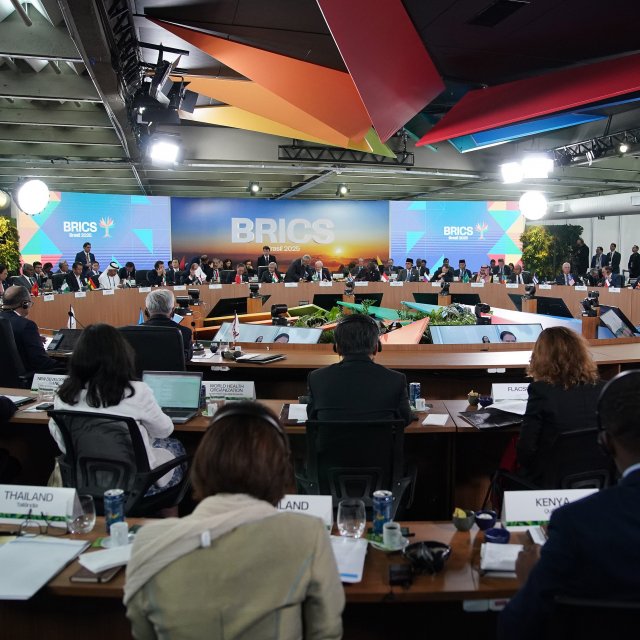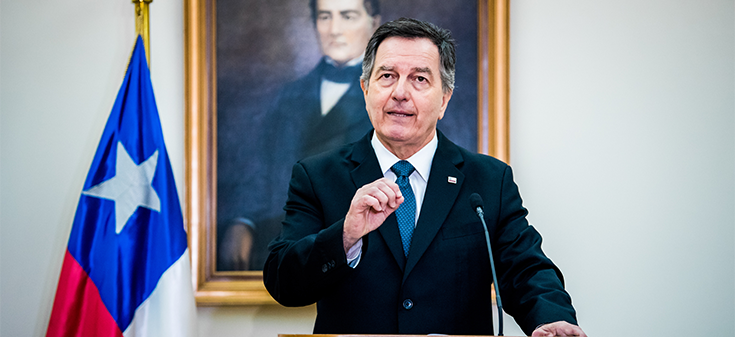 Lunes, 07 de julio de 2025
Canciller acompaña al Presidente en el jornada final de la XVII Cumbre de Líderes del BRICS
Lunes, 07 de julio de 2025
Canciller acompaña al Presidente en el jornada final de la XVII Cumbre de Líderes del BRICS
Foreign Minister Ampuero announces Chile's position on the Global Compact for Migration

The following is a statement by the Minister for Foreign Affairs, Roberto Ampuero, on the official position adopted by Chile in relation to the Pact on Migration voted by the United Nations.
Chile's migration policy is based on the following principles:
- The protection of and respect for the universal human rights of all migrants, regular or irregular, at all times, in all places and under all circumstances.
- The right of all individuals to leave their country of origin and move freely within the territory of a State in which they are legally present.
- The sovereign right of the State to determine who and under what regimes may enter its territory, as a matter regulated by domestic law in conformity with the State's international obligations.
Under these principles, we seek immigration that is safe, orderly and regular. This means exercising an open-door policy to receive those migrants who come to initiate a new and better life, with the intention of respecting our laws, those who come to join our society and contribute to the development of our country. But, at the same time, it means exercising a closed-door policy to stop irregular entry and prevent the entry of those who come to harm us, such as criminals, drug traffickers, organized crime and human trafficking groups.
In light of the foregoing, we consider that some aspects of the Migration Pact are not fully consistent with our migration policy and the principles that inspire it. For example:
- The Pact encourages irregular migration, as it does not clearly distinguish between regular and irregular immigrants with regard to family reunification and the granting of social benefits. It also promotes the entry of vulnerable immigrants who have not sought asylum or been recognized as refugees.
- The Compact introduces new requirements for the return of migrants. This means for the country of destination - even after expulsion - to create conditions for the economic and social integration of returned migrants.
- The Convention affects the sovereign right of every State to decide how to guard its borders, and especially the conditions of entry into its territory. The way in which Chile regulates its migration policy is essentially an internal matter, without prejudice to multilateral cooperation and compliance with our international obligations.
Chile is a country that deeply believes in the importance of multilateralism and is committed to dialogue and international cooperation, especially in the area of migration.
However, in this specific case, we have decided to abstain from voting in favour of the Migration Pact, as it does not fully safeguard the legitimate interests of our country and makes it difficult to protect our borders.
Artículos relacionados
 Lunes, 07 de julio de 2025
Canciller acompaña al Presidente en el jornada final de la XVII Cumbre de Líderes del BRICS
Lunes, 07 de julio de 2025
Canciller acompaña al Presidente en el jornada final de la XVII Cumbre de Líderes del BRICS
 Lunes, 07 de julio de 2025
Subsecretaria de Relaciones Exteriores se reúne con su par de Servicios Sociales
Lunes, 07 de julio de 2025
Subsecretaria de Relaciones Exteriores se reúne con su par de Servicios Sociales
 Domingo, 06 de julio de 2025
Canciller Alberto van Klaveren participa junto al Presidente Gabriel Boric en la XVII Cumbre del BRICS
Domingo, 06 de julio de 2025
Canciller Alberto van Klaveren participa junto al Presidente Gabriel Boric en la XVII Cumbre del BRICS








